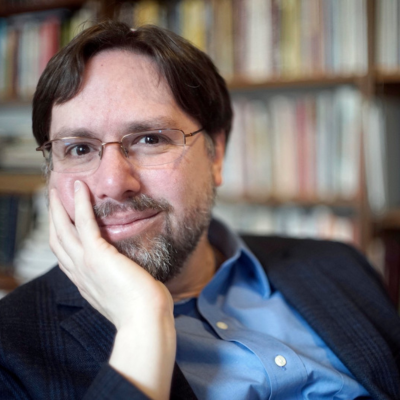I love stories. They’re an echo of the act of creation. Since our world was created through speech, storytelling is an act of re-creation, transforming reality just a little. A story in this week’s portion, Vayishlach, guides us in bringing a hint of change to our troubled times.
In a touching scene between estranged brothers, Jacob and Esau finally reunite: “Esau ran to greet him – he embraced [Jacob] and, falling on his neck, he kissed him, and they wept.” (Genesis 33:4) In the Torah, this passage is written with an unusual feature. The word vayishakeihu, “he kissed him,” has a dot above each letter. Rabbis and readers for centuries have wondered why.
Classic answers often stem from a deep suspicion of Esau. He was the progenitor of the Edomites (Genesis 36:8), who would later war with the Israelites. The rabbis mapped Esau to represent Rome and other oppressive rulers. The rabbinic phrase “Esau hates Jacob” would become an aphorism for antisemitism. It’s no surprise that one of the most famous rabbinic explanations for the “dotted kiss” is also one of the most problematic:
[The dots] teach that [Esau] did not come linashko / to kiss him, but rather linashcho / to bite him! But Jacob’s neck became marble and the teeth of the wicked one were blunted. So what does scripture indicate by saying, “And they wept?” It’s that the one wept on account of his neck and the other wept on account of his teeth. (Bereshit Rabbah 78:9)
I was horrified when I first read this midrash. Imagining Esau as untrustworthy and murderously violent leads only to mistrust and division. What benefit is there for us in reading that into the text?
Find more commentaries on Vayishlach.
Writer Chimamanda Ngozi Adichie offers us superb advice in countering this kind of narrative. Her TED talk “The danger of a single story”, teaches that we can open ourselves to redemptive truths by finding more than “a single story” about other people or cultures:
“The single story creates stereotypes. And the problem with stereotypes is not that they are untrue, but that they are incomplete. They make one story become the only story… It makes our recognition of our equal humanity difficult.”
In the aftermath of Hamas’s attack on Oct. 7, we must ensure that their single story of permanent war against Israel is not the only story told. We need a counter to the narrative that the cycle of violence between Jacob and Esau (or, going back a generation, between Isaac and Ishmael) can never be broken.
Fortunately, we have more than a single story to tell. For example, Yalkut Shimoni 722, a midrashic collection from approximately the 13th century, recounts, “It is well-known that Esau hates Jacob, but in that moment he turned to compassion and kissed him with all his heart.” Here, the text suggests that hate, as an ongoing state, can be transformed into compassion. Similarly, Ibn Ezra (12th century) redirects our attention to the text’s plain meaning, where Esau clearly intended no harm to Jacob.
Find more commentaries on Israel/Palestine.
One tool for us to help encourage peace among the children of Abraham is amplifying stories of peace among them. Even more than in their brotherly kiss, I find a promise of future peace through Jacob and Esau’s tears. As the 19th century Eastern European commentator Ha’amek Davar writes:
“…In that moment, love for Esau was roused in Jacob. And so on through the generations: Whenever the descendants of Esau are roused by a pure spirit to recognize the descendants of Israel and their status, then we too are roused to recognize Esau, for he is our brother.”
After Hamas’s attack, I initially struggled to find compassion for anyone but the Israelis. The suffering in Gaza failed to reach me; I numbed myself to their pain. However, holding only to that “single story” of Palestinian aggression “makes our recognition of our equal humanity difficult.” It blocks empathy, which prevents us from achieving peace.
One small but important step toward breaking free of this cycle of violence and fear is a willingness to see our “equal humanity.” Our stories can help us to find clarity when our vision is obscured by tears.
I imagine that Jacob’s and Esau’s tears began by grieving their lost opportunities to create loving memories. As those tears flowed, they turned to tears of relief that they had faced their fears and finally dared to embrace one another.
Let’s find courage together by sharing our stories about the world we wish to create; the world we want our children to inherit. As Herzl famously said about the State of Israel, “If you wish it, it is no myth.” It’s similar for crafting a world of peace: By telling our stories, they become no myth; our words become an act of redemptive creation.
Rabbi Josh Breindel serves as the rabbi of Congregation Beth El (Sudbury, MA). As “The Rabbi on the Radio”, he offers weekly reflections and music on Chagigah (WERS). As “The Sci-Fi Rabbi”, he blends ancient Jewish thought with modern speculative fiction in sermons, articles, and an open monthly book group.


